Related Research Articles

Barry Morris Goldwater was an American politician and major general in the Air Force Reserve who served as a United States senator from 1953 to 1965 and 1969 to 1987, and was the Republican Party's nominee for president in 1964.

Presidential elections were held in the United States on November 3, 1964. Incumbent Democratic President Lyndon B. Johnson defeated Republican Senator Barry Goldwater in a landslide victory. Johnson was the fourth and most recent vice president to succeed the presidency following the death of his predecessor and win a full term in his own right. Johnson won the largest share of the popular vote for the Democratic Party in history at 61.1%. As of 2024, this remains the highest popular vote percentage of any candidate since the advent of widespread popular elections in 1824.

William Edward Miller was an American politician who served in the United States House of Representatives from New York as a Republican. During the 1964 presidential election, he was the Republican nominee for vice president, the first Catholic nominated for the office by the Republican Party.
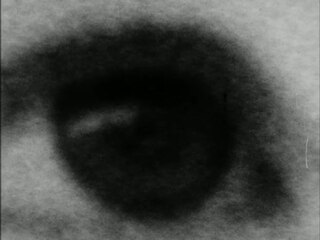
"Daisy", sometimes referred to as "Daisy Girl" or "Peace, Little Girl", is an American political advertisement that aired on television as part of Lyndon B. Johnson's 1964 presidential campaign. Though aired only once, it is considered one of the most important factors in Johnson's landslide victory over the Republican Party's candidate, Barry Goldwater, and a turning point in political and advertising history. A partnership between the Doyle Dane Bernbach agency and Tony Schwartz, the "Daisy" advertisement was designed to broadcast Johnson's anti-war and anti-nuclear positions. Goldwater was against the Nuclear Test Ban Treaty and suggested the use of nuclear weapons in the Vietnam War, if necessary. The Johnson campaign used Goldwater's speeches to imply he would wage a nuclear war.

William Fife Knowland was an American politician and newspaper publisher. A member of the Republican Party, he served as a United States Senator from California from 1945 to 1959. He was Senate Majority Leader from August 1953 to January 1955 after the death of Robert A. Taft, and would be the last Republican Senate Majority Leader until Howard Baker in 1981.

John Jacob Rhodes Jr. was an American lawyer and politician. A member of the Republican Party, Rhodes served as a U.S. Representative from Arizona for thirty years from 1953 to 1983. He was the minority leader in the House of Representatives from 1973 to 1981 and pressed a conservative agenda.
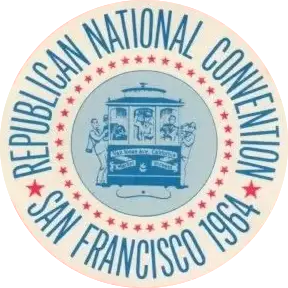
The 1964 Republican National Convention took place in the Cow Palace, Daly City, California, from July 13 to July 16, 1964. Before 1964, there had been only one national Republican convention on the West Coast, the 1956 Republican National Convention, which also took place in the Cow Palace. Many believed that a convention in San Francisco indicated the rising power of the Republican Party in the west.

Lewis Williams Douglas was an American politician, diplomat, businessman and academic.

Barry Morris Goldwater Jr. is an American politician. He is a former Republican member of the United States House of Representatives from California, serving from 1969 to 1983. He is the son of U.S. Senator and 1964 Republican presidential nominee Barry Goldwater.

Roy Dean Burch was an American lawyer and lobbyist. He served as chairman of the Federal Communications Commission (FCC) from October 1969 to March 1974 and Counselor to the President in 1974, during the administrations of U.S. President Richard Nixon and Gerald Ford. From 1964 to 1965, he was the chairman of the Republican National Committee, during the Barry Goldwater presidential campaign.
The 1964 presidential campaign of Barry Goldwater began when United States Senator Barry Goldwater of Arizona elected to seek the Republican Party nomination for President of the United States to challenge incumbent Democratic President Lyndon B. Johnson. Early on, before officially announcing his candidacy for the presidency, Goldwater was accused by Governor of New York Nelson Rockefeller of attempting to galvanize Southern and Western Republican support while neglecting the industrial northern states, eventually becoming one of Goldwater's primary opponents in the race for the Republican Party's nomination in 1964.

From March 10 to June 2, 1964, voters of the Republican Party elected 1,308 delegates to the 1964 Republican National Convention through a series of delegate selection primaries and caucuses, for the purpose of determining the party's nominee for president in the 1964 United States presidential election.

Edwynne Cutler "Polly" Rosenbaum was a teacher and politician who was Arizona's longest-serving state legislator, representing Gila County in the Arizona House of Representatives for 46 years.
Denison Kitchel was a lawyer from Phoenix, Arizona, who was an influential advisor to and the campaign manager of Republican Barry M. Goldwater in the 1964 U.S. presidential campaign against the Democrat Lyndon B. Johnson.
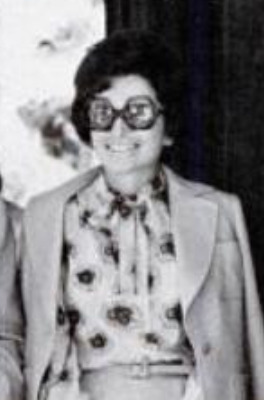
Rita Crocker Clements was an American Republican Party organizer, an activist in historic preservation, and a First Lady of the U.S. state of Texas.
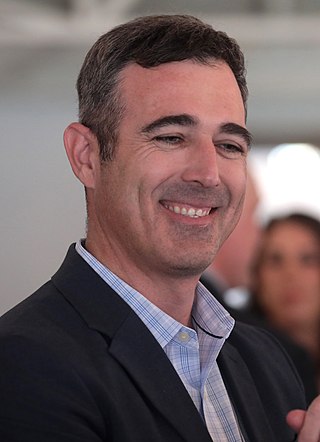
Demion Clinco is an American politician, historic preservationist, philanthropist, and business leader from the state of Arizona. Clinco's social innovation included reestablishing the Tucson Historic Preservation Foundation in 2008 and launching Tucson Modernism Week in 2012 and work in the higher-education sector. A member of the Democratic Party, Clinco served in the Arizona House of Representatives, as a member for the second district until 2015. In December 2015 Clinco was appointed to the Governing Board of Pima Community College. Clinco was elected in 2016 to serve a full term and in January 2018 was elected chairman of the college's Governing Board. Under Clinco's leadership the college initiated large-scale bond projects focusing on workforce development and career technical education. During this period the college underwent a significant educational and physical transformation with the construction of major buildings including Centers of Excellence in applied technology, advanced manufacturing, automotive, aviation, and allied health. In 2019 Clinco relaunched and led the reorganization of the Arizona Association of Community College Trustees serving as the president. Clinco has served on numerous local, statewide, national and international boards.

Keith Spalding Brown was an American athlete, politician and businessman. He broke the pole vault world record both indoors and outdoors and was also a good high jumper. He later became involved in politics and served as the Republican Party's state chairman in Arizona for two years.
Stephen Caroyl Shadegg was a conservative political consultant, public relations specialist, and writer from his adopted city of Phoenix, Arizona.
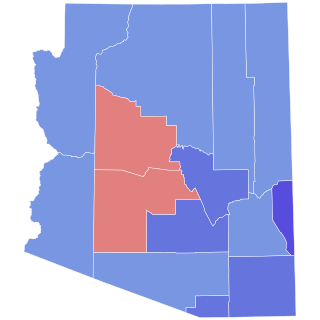
The 1964 Arizona gubernatorial election took place on November 3, 1964. Incumbent Governor Paul Fannin decided not to run for reelection to a fourth term as governor, instead deciding to successfully run for the United States Senate when incumbent U.S. Senator Barry Goldwater decided to run for President of the United States.

The 1964 United States presidential election in Maine took place on November 3, 1964, as part of the 1964 United States presidential election, which was held throughout all fifty states and D.C. Voters chose four representatives, or electors to the Electoral College, who voted for president and vice president.
References
- 1 2 3 4 5 6 7 8 9 10 11 12 "Ann-Eve Mansfeld Johnson". AWHF. Retrieved 2024-04-28.
- 1 2 3 By, M. S. (1964, Jul 17). Barry may appoint a Johnson. The Washington Post, Times Herald (1959-1973).
- 1 2 3 Pakenham, M. (1964, Sep 19). About women in washington. Chicago Tribune (1963-1996).
- ↑ Cole, Ben (January 20, 1975). "Remember 1964? Goldwater, Friends Celebrate Anniversary of Non-Presidency". The Muncie Star. p. 5.
- ↑ Barclay, Martha Thomson. "Distaff campaigning in the 1964 and 1968 presidential elections." Communication Studies 21.2 (1970): 117-122.
- ↑ "Ann-Eve Johnson Award". Junior League of Tucson. Retrieved April 28, 2024.